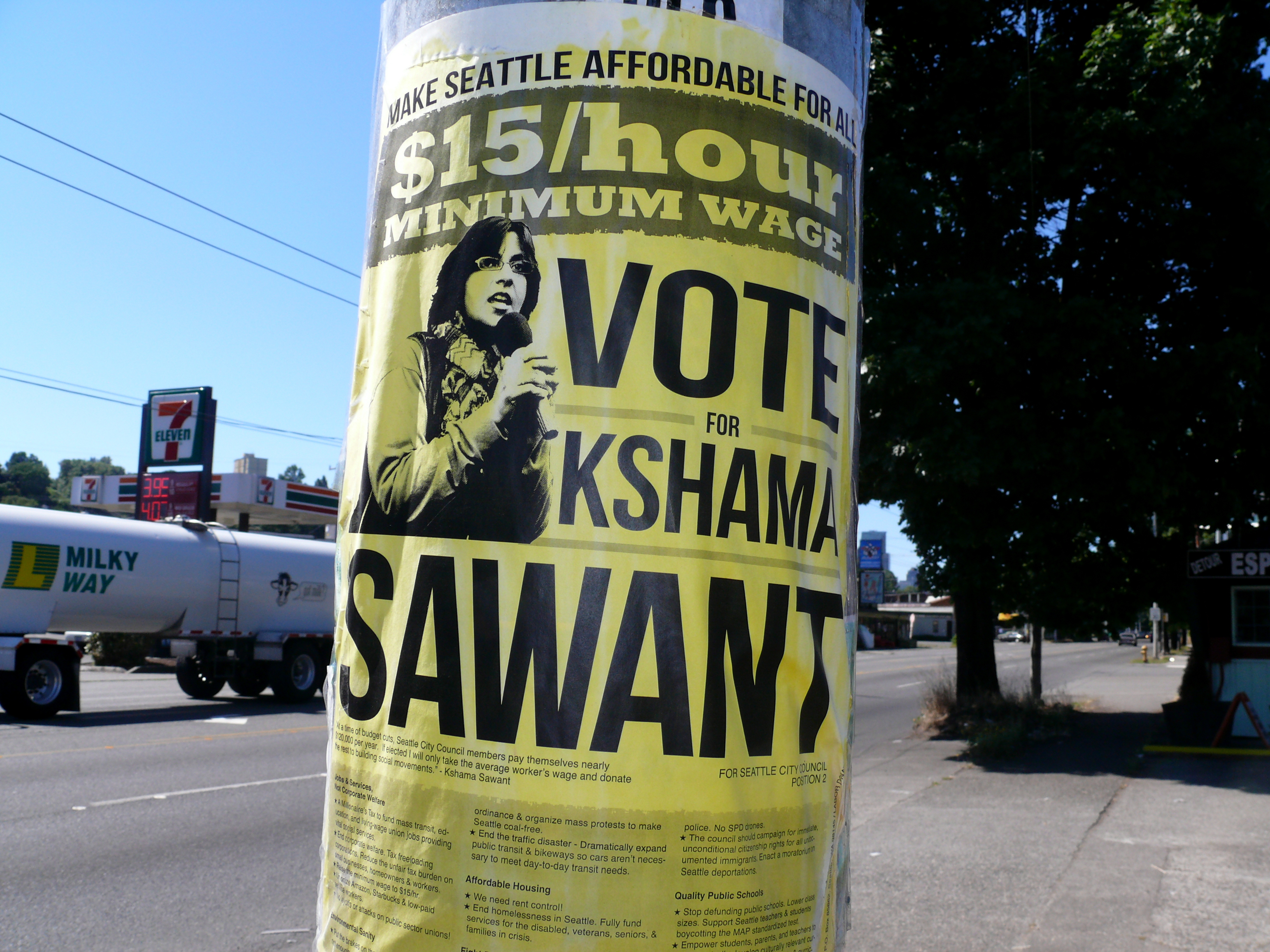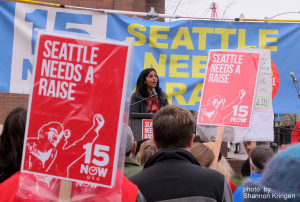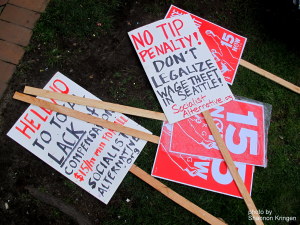Kshama Sawant made headlines last year as the first socialist elected to the Seattle city council in over a century. Along with her party, Socialist Alternative, Sawant led the charge to increase the minimum wage to $15 per hour in Seattle. Last week Sawant was in Vancouver for her first post-election visit to Canada. She sat down with The Talon to talk a little bit about her win, student organizing, and smashing capitalism.
Sawant explained that she never took an interest in activism as a student and came to politics much later in life. “I always hate to disappoint people because I always think people expect some sort of magical story to my life. And, in some ways I’m happy there isn’t. No, to answer your question, I wasn’t part of any political activism in India. I was born in a very loving but apolitical family; ideologically and intellectually I was always a misfit. I knew that life was not for me and I knew I would find what I was looking for when I found it, if that makes sense to you. […] But I didn’t find it for the longest time. And so I didn’t become part of anything.”
Her life radically changed five years ago, however, when she stumbled upon socialism. “For a lot of people who arrive at Marxism and eventually become members of revolutionary organizations, they have tried the NGO or single-issue organization path or all of that. I didn’t join anything because I just instinctively knew that that wasn’t for me. And then in 2009 I heard a speech by a Socialist Alternative member in Seattle and that was it. I knew that was what I was looking for and I immediately sent an email saying ‘what do you guys do and how can I talk more with you?’ and I never looked back since.”
Rather than a bad omen, Sawant feels that her late entry into politics has hopeful implications for the global socialist movement: “In a way, I’m happy that I don’t have any real story to tell you about myself because it allows me to explain that there is nothing unique about me […] we’re all unique, we all have interesting stories about ourselves but if it was something that was really unique to me or one other celebrity politician or whatever, then we would be in big trouble. We would not be able to build social movements […] The working class has in itself the intellect and the organizing potential in a really big way – we can organize global struggles because there are so many of us that have so much to give. What our job is today is to draw that out.”
“Young people especially are completely disgusted by the corruption and money in corporate politics and feel disengaged and sort of disenfranchised […] They don’t feel that politics is anything good to be engaged in because it doesn’t represent them.” Sawant’s city council campaign was driven largely by youth volunteers, who were inspired by her vocal opposition to Seattle’s pro-corporate politics: “When they saw our campaign, they recognized in it a real force for things that they believe in, the values that they hold as young people, but it went much farther than that.
“When we called for $15 an hour, that really took the attention of young people in schools and colleges but also young people who had graduated and were stuck in low-wage jobs […] Many of them told me, ‘I’m going to have a $100,000 debt, […] it’s a ball and chain around my neck for the rest of my life, […] I’m probably going to die with it.’ So, we had lots of tremendous political conversations with a lot of young people about what should be done, what is it that society owes the younger generation especially those who were told that […] ‘You do everything right, you put your head down, get good grades, you are promised the American Dream’ and clearly that’s not happening… Young people, especially, are looking for answers.”
Noam Chomsky has referred to student debt as a sort of disciplinary technique – students with large debts are unlikely to think about changing the status quo. Sawant agreed with that characterization. “When you graduate from college with a $150,000 debt what is your most immediate concern? You wanna get a good job and you wanna start paying it off and […] you wanna get a decent standard of living.”
“Student debt is just the latest incarnation of the normal process under capitalism where the working class is pushed into this role, this subservient role of the wage slave. But that happens in many different ways: the creation of the nuclear family, the very prescriptive roles for women and men within nuclear families, […] the curtailment of women’s rights and the attacks against women’s rights, all of these are in that same universe of disciplinary tactics used by capitalism to keep the working class in line. … I think student debt is just a more egregious form of that happening.”
However, Sawant is optimistic about the future of the student movement against debt. “I think student debt is exploding at a time when socially we are in a different era, […] we are stepping into an era of explosive social movements and so it also shows you how the ‘disciplinary tactic’ can turn into a nightmare for capitalism itself – potentially, but that depends on us. If we build strong movements, if we build really radical, powerful movements where the youth can play a leading role, then it is possible to turn the tide against the ruling class and use that as a weapon against it.
“Cancellation of student debt is something that could potentially really bring young people into social movements because it calls on their personal anger that they feel for being saddled with this kind of injustice when they’ve done everything right.”
Sawant sees a need to politicize our understandings of the world in order to enact social change. “Ultimately, all of these social problems that we’re talking about, whether its student debt or racial injustice or climate change, really, they’re not social questions or scientific questions or, you know, climactic questions. They’re questions about politics, about political power […] How do we build the political power of the working class and the youth and the environmental movements? That’s how each of these questions has to be posed and the advantage of doing that, not only that it is the way movements succeed – if you don’t politicize it you don’t succeed […] but the other thing is that having those kinds of political movements really clarifies to working people what their role is. It’s not a question of waiting for largess from some do-gooders. It’s a question of really building your own power inside yourself. It has to be self-empowering.” This need to politicize issues to create the potential for meaningful change feels especially relevant in our campus context, where students are encouraged to think in strictly apolitical terms about their tuition, their student society, their campus newspaper, and their overall undergraduate academic experience.
Belief in radical social change is often characterized as a ‘naive and idealistic’ trademark of youth that ultimately fades with age. As a young activist, sometimes it feels like a smug confidence in this trajectory is, in itself, one of the pillars of fiscal conservativism. Sawant is used to hearing similar critiques to her politics. “The best way to defend yourself is to go on the offensive […] Show how ‘naive and idealistic’ it is to expect that any social justice will come about under capitalism. We have nothing to hide in the sense that our vision for society, a socialist society, is completely rational. It is completely in line with human nature. It is completely in line with the desires of social beings, human beings, and it is completely in line with what the planet needs. So really, what needs a balance sheet, what needs to [be] challenged, what needs to be put in court and indicted is capitalism’s record […]
“Show how under capitalism there has been a systematic decline in peoples’ standards of living, systematic declines in personal freedoms and civil rights, […] brutal attacks against people of colour, especially the black community. Show how racial justice has taken a turn for the worse. Show how, even though twenty-five or thirty years ago scientists already told us that greenhouse gas emissions are going to be the death knell of society, greenhouse gas emissions have gone up under capitalism. Show all the failures of capitalism: poverty has gone up, malnutrition has gone up, hunger has gone up, attacks on women’s rights are on the increase. And, provide a litany of the failures of the parties that represent capitalism – in the United States that’s the Democratic Party establishment and the Republican party establishment.
“When you provide that track record, that balance sheet, it becomes clear to people that […] capitalism is the one that has failed. And if we continue to put our faith in a system that has so systematically failed for the last five decades, then that’s ‘naive and idealistic.’”
It would be misguided to assume that Sawant’s decision to seek office at the municipal level is somehow at odds with the worldwide scope of her socialist aspirations. ‘Thinking globally and acting locally’ is actually key to her understanding of social movements and structural change, she explained: “If we are to genuinely grapple with questions of systemic change, which I think many of the youth are thinking about, then you have to think about it from an international standpoint. That’s why I’m a marxist and an internationalist, because we have to fight battles wherever we are, but never forgetting that capitalism is an international system. That means the solution has to be international, that means that the working class internationally cannot be divided by nation states […] We cannot solve all the problems of the world today here in Vancouver but we gotta have that perspective, and that perspective sometimes helps us with local solutions as well. So remembering that student debt is a meaningless question in Latin America or Asia or Africa helps us to remember that, ‘oh wait a minute, that means that I do have to build a political movement here.’”
She also feels that people are often too narrow in their analysis of capitalist culture and the scope of inequality. “In the US you often hear about how it’s too consumerist. I often hear that, as an Indian, ‘oh I’m so envious of you that you are Indian, you’re not stuck in this American consumerist lifestyle.’ I don’t know how to react to that often because I feel like, well the problem for the most part under capitalism, you know for the majority of people, not the Western world but you know the rest of the world […], the problem is underconsumption. We don’t have access to plumbing. We don’t have access to water, electricity.. the tens of millions of women in the various continents who are stuck with the daily drudgery of washing clothes by hand because they don’t have access to the basic, outdated technology of washing machines. Why is that? Because capitalism does an extremely poor job of distributing basic technology to all human beings. So you can’t take the message of ‘consume less’ to Africa and have those women join you for a fight back against capitalism. What we have to offer is a vision of a very high standard of living, but in a sustainable manner. And that requires more thinking.”
Fundamental to the battle against capitalism, according to Sawant, is youth organizing. “Youth really are the harbinger of major socialist movements,” she said “Even in the past if you look at the biggest social upheavals, you’ll see that in order to really hit capitalism where it hurts, you will need broad layers of the working class to refuse to go to work, […] that’s the weapon we have in our hands. Capitalism’s raison d’etre is profit maximization for the owners of capital but that profit does not get generated unless hundreds of millions of people go to work every day. We have an enormous weapon in our hands, just by refusing to spend another day in that profit-making machine which needs us.
“Ultimately, in order to pose a serious challenge to the system, that will be necessary. But the way that will often happen is when the youth take the first step forward in igniting the spark for major social movements […] Everywhere you go, you will see the youth on the front lines of social movements, always.”
Special thanks to Josh Gabert-Doyon and Tristan Markle for their assistance with this piece.






